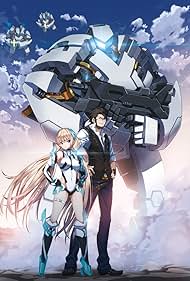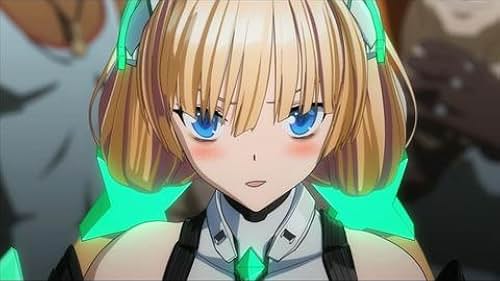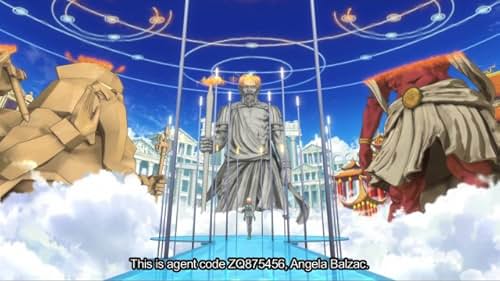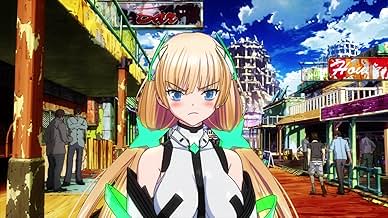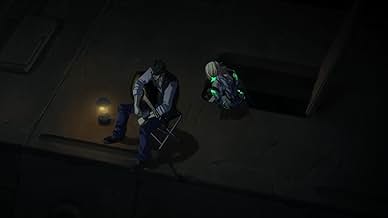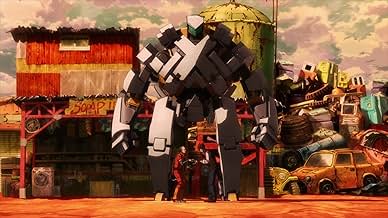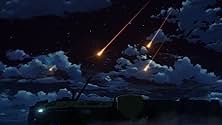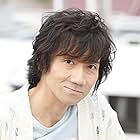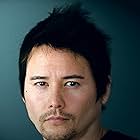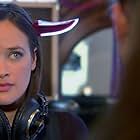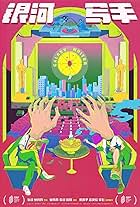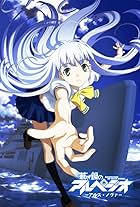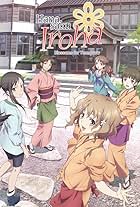IMDb RATING
6.6/10
1.9K
YOUR RATING
With Earth in ruins, humanity no longer takes corporeal form and exists in a virtual society known as 'DEVA'. When a hacker infiltrates the cyber universe, Officer Angela Balzac is dispatche... Read allWith Earth in ruins, humanity no longer takes corporeal form and exists in a virtual society known as 'DEVA'. When a hacker infiltrates the cyber universe, Officer Angela Balzac is dispatched to the surface to track him down.With Earth in ruins, humanity no longer takes corporeal form and exists in a virtual society known as 'DEVA'. When a hacker infiltrates the cyber universe, Officer Angela Balzac is dispatched to the surface to track him down.
- Awards
- 1 win & 1 nomination
Rie Kugimiya
- Angela Balzac
- (voice)
Wendee Lee
- Angela Balzac
- (English version)
- (voice)
Steve Blum
- Zarik 'Dingo' Kajiwara
- (English version)
- (voice)
Johnny Yong Bosch
- Frontier Setter
- (English version)
- (voice)
Brina Palencia
- Christin Gillum
- (English version)
- (voice)
Megan Hollingshead
- Veronica Kulikova
- (English version)
- (voice)
Beau Billingslea
- High Official A
- (English version)
- (voice)
- …
Minoru Inaba
- High Official A
- (voice)
Hisao Egawa
- High Official B
- (voice)
Kirk Thornton
- High Official B
- (English version)
- (voice)
Noriko Uemura
- High Official C
- (voice)
Kenta Miyake
- Issac
- (voice)
Daichi Endô
- Lazlo
- (voice)
- (as Daichi Endo)
Storyline
Did you know
- TriviaThe place the robots making a deal is near subway station of 34th Street/Penn Station in Manhattan after apocalypse.
- GoofsIn AD 2400 Dingo still uses a laptop with Windows 7.
- Quotes
Angela Balzac: Now I know how Adam and Eve felt when they were expelled from Paradise.
- Crazy creditsThere is a mid-credits and post-credits scene.
- ConnectionsFollowed by Liberated from Paradise
Featured review
Nice anime. Not that it shines with art, music or a twisted plot. All these are of high quality, but not at all at an outstanding level. What makes "Rakuen Tsuihou" special is the presence of common sense in both the characters' behavior and the development of the plot. It may not be possible to agree with all the ideas, but intellectually, this anime will not keep you gritting your teeth waiting for the end of the story. What also pleases are adequate, adult heroes who have reasonable motivations and behavior appropriate to situations. The "incarnated" heroine experiences all the unexpected effects of having a body, including fatigue, illness, and the inability to cope with the three goons in the real world. Of course, it was not without exaggeration of her naivety, honesty, kawaii and the abuse of curvy forms with oppai swaying, but these exaggerations, perhaps, were designed to compensate for her negative features, outweighing them and arousing sympathy for the heroine, because otherwise she a self-centered careerist with views that would flinch even National Socialists. The hero, on the other hand, is quite a mature, calm and perceptive man, not a hysterical teenager. In general, the characters are quite sympathetic and cause empathy, the intimate narrative focuses on the development of their relationships and meaningful, not at all stupid dialogues. In terms of the plot, there are a couple of unexpected turns and an intrigue that does not disappear almost until the very end - what will the main heroine choose?
As for the moral message of the anime, the raised issues, perhaps the problems of "humanization" and "dehumanization" are considered superficially in the Rakuen Tsuihou, but clearly deeper and more insightful than in other works with a similar theme. Even in a seemingly "ideal world" where there can be no problems with food, housing, money and other material goods, people still found something to envy and on that basis to destroy other people ("archive" them). It shows a great deal of a fundamental, incorrigible flaw in human nature ("original sin", as Christianity calls it) - no matter how ideal society you build, how you'd avoid competition for resources, there will always be such a resource (anything - strength, power, money, popularity, health, beauty, intelligence, space, skin color, tall height, short, big breasts, small, long legs, short, virtual avatar, or allocated memory), which will cause envy, competition, conflicts and, ultimately, poverty (in relation to this resource), oppression and deprivation of life of the "unworthy". Neither world peace, nor communism, nor capitalism, nor "virtual heaven" will help - by virtue of human nature, all the same problems will flourish, and most likely, they will multiply the more the more they are denied...
Although this is not emphasized in the rather light narrative of the anime, "Rakuen Tsuihou" is a dystopia, where the "virtual heaven" became a hell ruled by self-proclaimed "gods" (in the form of which the elite of the pseudo-heaven is depicted) who established totalitarian control over the population of their world and turned it into slaves obsessed with competition for the resource of computing power. Correctly noticing the fatal flaw of humanity (original sin), the ineradicable incompleteness of human existence, the screenwriter, unfortunately, draws false conclusions from this, placing his hopes on artificial intelligence as a kind of perfect "child of humanity". However, for a non-Christian, the screenwriter is already perspicacious enough and unable to go further, except for creating an idol, but no longer from a man, but from an "intelligent" machine. To a Christian it should be clear that the only solution to the problem of mimetic desire, to use the terminology of Rene Girard, or original sin, is to look not to another person or object (idols), but to the one whose resources are not limited, like Him himself, to the one who possesses the fullness of being - to God. But, again, one cannot demand such philosophical and theological depth from Japanese anime. What is already depicted does not cause intellectual rejection and does not sin against common sense (except for the idealization of AI, of course).
There are a couple of plot flaws, such as why it was necessary to go to battle, if it was possible to simply hack and turn off the enemy's machines (here logic suffers for the sake of entertainment), or what feelings digitized "people" may have if organs of these senses (not gauges of abstract units) are missing? I'm not even talking about ignoring the problem of copying (not sending "consciousness" - but in this case all "humanization" of digitized "people" and empathy for the heroine would have disappear because of her countless copies) and interference in the "consciousness" of virtual "people". Ultimately, I believe, all "consciousnesses" would be "hacked" and "dehumanized" by the ruling elite to the level of machines, obedient performers - for the sake of the "common good", of course, the eradication of deviations and so on, but in fact - because it would be easier to rule and there would be no obstacles to this, like physical bodies. Or most likely the elite would begin to self-copy uncontrollably, gathering all the computing power for their copies and cutting out the rest of the "programs" so that they would not take up space until "there will be only one left" with an army of controlled copies. But in that case, there would be no one to make this anime about, which, for its atypical for Japanese thinking, pleasant, adequate characters and rationality.
As for the moral message of the anime, the raised issues, perhaps the problems of "humanization" and "dehumanization" are considered superficially in the Rakuen Tsuihou, but clearly deeper and more insightful than in other works with a similar theme. Even in a seemingly "ideal world" where there can be no problems with food, housing, money and other material goods, people still found something to envy and on that basis to destroy other people ("archive" them). It shows a great deal of a fundamental, incorrigible flaw in human nature ("original sin", as Christianity calls it) - no matter how ideal society you build, how you'd avoid competition for resources, there will always be such a resource (anything - strength, power, money, popularity, health, beauty, intelligence, space, skin color, tall height, short, big breasts, small, long legs, short, virtual avatar, or allocated memory), which will cause envy, competition, conflicts and, ultimately, poverty (in relation to this resource), oppression and deprivation of life of the "unworthy". Neither world peace, nor communism, nor capitalism, nor "virtual heaven" will help - by virtue of human nature, all the same problems will flourish, and most likely, they will multiply the more the more they are denied...
Although this is not emphasized in the rather light narrative of the anime, "Rakuen Tsuihou" is a dystopia, where the "virtual heaven" became a hell ruled by self-proclaimed "gods" (in the form of which the elite of the pseudo-heaven is depicted) who established totalitarian control over the population of their world and turned it into slaves obsessed with competition for the resource of computing power. Correctly noticing the fatal flaw of humanity (original sin), the ineradicable incompleteness of human existence, the screenwriter, unfortunately, draws false conclusions from this, placing his hopes on artificial intelligence as a kind of perfect "child of humanity". However, for a non-Christian, the screenwriter is already perspicacious enough and unable to go further, except for creating an idol, but no longer from a man, but from an "intelligent" machine. To a Christian it should be clear that the only solution to the problem of mimetic desire, to use the terminology of Rene Girard, or original sin, is to look not to another person or object (idols), but to the one whose resources are not limited, like Him himself, to the one who possesses the fullness of being - to God. But, again, one cannot demand such philosophical and theological depth from Japanese anime. What is already depicted does not cause intellectual rejection and does not sin against common sense (except for the idealization of AI, of course).
There are a couple of plot flaws, such as why it was necessary to go to battle, if it was possible to simply hack and turn off the enemy's machines (here logic suffers for the sake of entertainment), or what feelings digitized "people" may have if organs of these senses (not gauges of abstract units) are missing? I'm not even talking about ignoring the problem of copying (not sending "consciousness" - but in this case all "humanization" of digitized "people" and empathy for the heroine would have disappear because of her countless copies) and interference in the "consciousness" of virtual "people". Ultimately, I believe, all "consciousnesses" would be "hacked" and "dehumanized" by the ruling elite to the level of machines, obedient performers - for the sake of the "common good", of course, the eradication of deviations and so on, but in fact - because it would be easier to rule and there would be no obstacles to this, like physical bodies. Or most likely the elite would begin to self-copy uncontrollably, gathering all the computing power for their copies and cutting out the rest of the "programs" so that they would not take up space until "there will be only one left" with an army of controlled copies. But in that case, there would be no one to make this anime about, which, for its atypical for Japanese thinking, pleasant, adequate characters and rationality.
- smoothrunner
- Nov 2, 2022
- Permalink
- How long is Expelled from Paradise?Powered by Alexa
Details
- Release date
- Country of origin
- Official site
- Language
- Also known as
- Изгнанные из Рая
- Production companies
- See more company credits at IMDbPro
Box office
- Gross US & Canada
- $34,510
- Opening weekend US & Canada
- $18,869
- Dec 14, 2014
- Gross worldwide
- $34,510
- Runtime1 hour 44 minutes
- Color
- Sound mix
- Aspect ratio
- 1.85 : 1
Contribute to this page
Suggest an edit or add missing content

